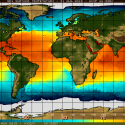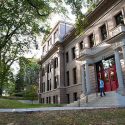Cicada experts and resources available from UW–Madison
A historic double brood of cicadas is expected to emerge this spring, with hatchings centered on the Eastern and Midwestern parts of the United States. Experts from UW–Madison are available for interviews about the biology of the deafening insects and their role in culture and art.
Resources
New website
The cicada-verse is yours for the exploration with the new online resource. Here, you can listen to a historic cicada recording from the Library of Congress, get a crash course in cicada biology, and learn about the history and future of periodical cicadas in Wisconsin. The site was built by PJ Liesch, director of the UW–Madison Insect Diagnostic Lab. https://cicadas.wisc.edu/
Contact: PJ Liesch, pliesch@wisc.edu
Insect ambassadors
Insect ambassadors is a graduate student-led organization hosted by the Department of Entomology. The group exists to share its love of bugs with the wider world.
Contact: Emma Terris, eterris@wisc.edu
Experts
Cicada biology
PJ Liesch is director of the UW–Madison Insect Diagnostic Lab. Liesch can discuss the emergence of periodical cicadas, cicada biology, the timing and distribution of periodical cicadas in Wisconsin and the ecological impacts of these insects. Liesch is tracking the impact of early spring weather on cicada emergence. He says, “A key factor for emergence of periodical cicadas is the temperature of the soil at a depth of 8 inches. The soil temperature must reach and exceed 64.5 F, so depending on weather, we could see emergence shifted a bit earlier.”
Contact: PJ Liesch, pliesch@wisc.edu
Cicadas and natural history
Daniel Young is a professor of entomology and director of the UW–Madison Insect Research Collection. Young is an expert on insect classification and natural history and teaches a course called Introductory Entomology that covers brood XIII cicada emergence.
Contact:Daniel Young, young@entomology.wisc.edu
The poetry of cicadas
William Brockliss is a classics professor in the College of Letters and Science. Brockless says the music of cicadas is embedded within the poetry of ancient Greece. In The Illiad, says Brockliss, Homer “likens the chatter of old men to the sound of cicadas.” Another early poet, Hersiod, compares a single cicada to a singer, and possibly the poet himself.
Brockliss says, “As a Greek friend of mine once put it, he knows he’s home when he hears the sound of the cicadas. While other plant and animal species contribute to the visual environment of Greece and the wider Mediterranean, cicadas are an ever-present constituent of the region’s auditory environment, at least in the summer. For this reason, ancient Greek poets were able to draw on the cicada in their creation of similes describing sounds.”
Contact: William Brockless, brockliss@wisc.edu
More experts on news and current events can be found on the UW–Madison Experts Database.
Tags: media tips



